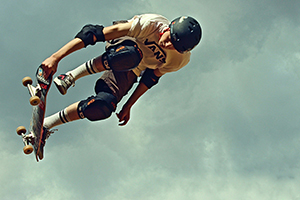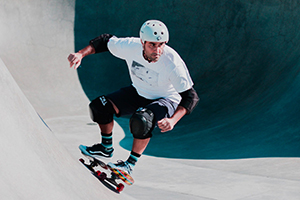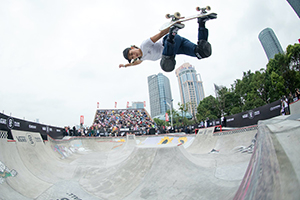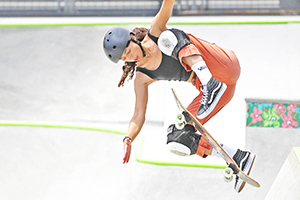SKATEBOARDING
A skateboard is a short, narrow board with two small wheels attached to the bottom of either end. Skateboarders ride on this apparatus to perform tricks including jumps (ollies), flips and mid-air spins. The sport of skateboarding will make its Olympic debut at the Tokyo 2020 Games.
SPORT HISTORY
There are various theories about the origins of skateboarding, but it is generally held that the sport began in the 1940s on the west coast of the USA when metal wheels were attached to a narrow wooden board. In the 1950s, clay composite replaced metal as the material of choice for the wheels, and the first ‘Sidewalk Surfboard’ became commercially available, which in turn developed into the skateboard that we know today. The sport was a big hit with the younger generation and with the advent of the urethane wheel in the 1970s, grew in global popularity. Since the 1980s, skateboarding has been an essential part of street culture.
A UNIQUE EXPERIENCE IN A DYNAMIC URBAN VENUE
In skateboarding, the rider is free to select which parts of the course to tackle and which tricks to perform. Even when the same tricks are performed, the flow of the performance can depend greatly on the speed attained. While speed is an important element, marks are awarded for the overall level of difficulty and originality. In addition, competition judges also take into account the overall flow, timing, consistency and the extent skateboarders are able to create the sensation of being suspended in mid-air. Music is an important accompaniment and will contribute to a vibrant and youth-focused atmosphere at the Aomi Urban Sports Venue, which will also host 3x3 basketball and sport climbing. This temporary facility will be the dynamic and innovative home to the Games' newest events, increasing the opportunity for engagement with fans and delivering a unique Tokyo 2020 experience.
Highest Governing Body
World Skate
First Played
Late 1940s United States
Contact
None
Team Members
Single, no teams
Type
Action sport





